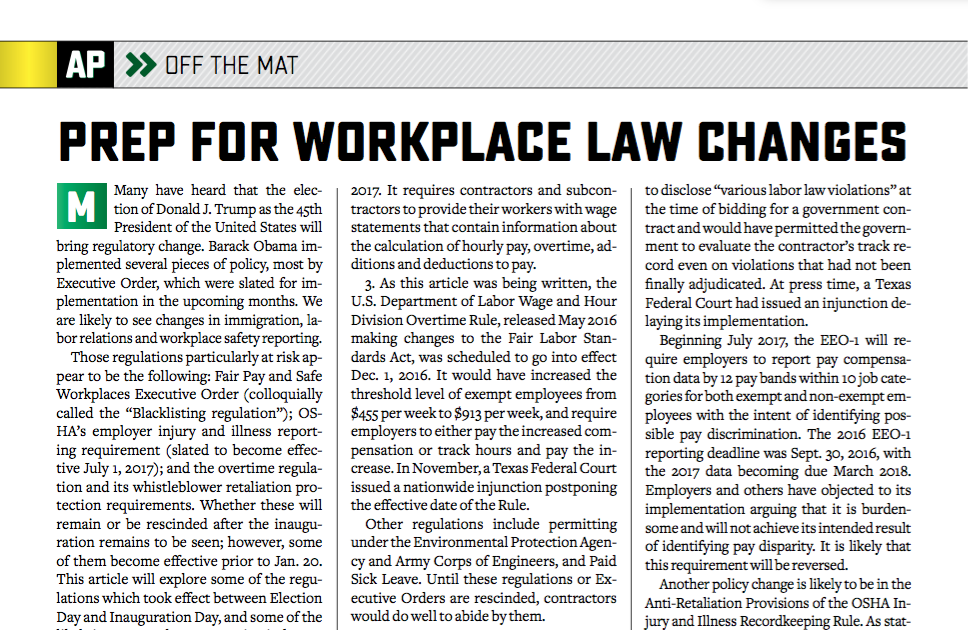Prepare for New Administration’s Employment, Workplace Law Changes
BY Lorraine D'Angelo

Many have heard that the election of Donald J. Trump as the 45th President of the United States will bring regulatory change. Barack Obama implemented several pieces of policy, most by Executive Order, which were slated for implementation in the upcoming months. We are likely to see changes in immigration, labor relations and workplace safety reporting.
Those regulations particularly at risk appear to be the following: Fair Pay and Safe Workplaces Executive Order (colloquially called the “Blacklisting regulation”); OSHA’s employer injury and illness reporting requirement (slated to become effective July 1, 2017); and the overtime regulation and its whistleblower retaliation protection requirements. Whether these will remain or be rescinded after the inauguration remains to be seen; however, some of them become effective prior to Jan. 20. This article will explore some of the regulations which took effect between Election Day and Inauguration Day, and some of the likely impacts to the construction industry.
Comply Until Further Notice
1. The Anti-Retaliation Provisions of the OSHA Injury and Illness Recordkeeping Rule
This regulation took effect Dec. 1, 2016. Section 11(c) of OSH Act already prohibits any person from discriminating against an employee who reports a workplace injury, but OSHA cannot act until an employee files a complaint. These new rules permit OSHA to cite an employer for retaliation without an employee complaint. You are required to inform your workers about their reporting rights. Consider using resources published by OSHA such as the poster “It’s the Law,” workers’ rights pamphlet and magnets. https://www.osha.gov/workers/index.html. Make sure all actions are appropriately documented.
2. Fair Pay and Safe Workplaces Executive Order
Although most of the requirements of this Executive Order were enjoined by a Federal Court, it did not stop the pay transparency section of the regulation. The pay transparency portion is effective Jan. 1, 2017. It requires contractors and subcontractors to provide their workers with wage statements that contain information about the calculation of hourly pay, overtime, additions and deductions to pay.
3. As this article was being written, the U.S. Department of Labor Wage and Hour Division Overtime Rule, released May 2016 making changes to the Fair Labor Standards Act, was scheduled to go into effect Dec. 1, 2016. It would have increased the threshold level of exempt employees from $455 per week to $913 per week, and require employers to either pay the increased compensation or track hours and pay the increase. In November, a Texas Federal Court issued a nationwide injunction postponing the effective date of the Rule.
Other regulations include permitting under the Environmental Protection Agency and Army Corps of Engineers, and Paid Sick Leave. Until these regulations or Executive Orders are rescinded, contractors would do well to abide by them.
Possible Impacts to the Construction Industry
Aside from rescission of the aforementioned regulations and Executive Orders, we are likely to see an uptick in immigration enforcement actions. It is time to check that your compliance is in order regarding your employees’ completion of their I-9 Employment Eligibility forms. Do you currently participate in E-Verify? E-Verify is the federal program that mandates employment eligibility checks and may be an option if your I-9 compliance is not up to par.
In the labor relations arena, we are likely to see policy that favors employers. For instance, some pro-union activities, particularly in the area of dues payments and mandatory union participation, may see change. Changes to the NLRB are likely as well and we may see the appointment of pro-employer members to the NLRB.
If the following items were to be rescinded or modified, the construction industry could see changes in operation.
The Fair Pay and Safe Workplaces Executive Order would have required companies to disclose “various labor law violations” at the time of bidding for a government contract and would have permitted the government to evaluate the contractor’s track record even on violations that had not been finally adjudicated. At press time, a Texas Federal Court had issued an injunction delaying its implementation.
Beginning July 2017, the EEO-1 will require employers to report pay compensation data by 12 pay bands within 10 job categories for both exempt and non-exempt employees with the intent of identifying possible pay discrimination. The 2016 EEO-1 reporting deadline was Sept. 30, 2016, with the 2017 data becoming due March 2018. Employers and others have objected to its implementation arguing that it is burdensome and will not achieve its intended result of identifying pay disparity. It is likely that this requirement will be reversed.
Another policy change is likely to be in the Anti-Retaliation Provisions of the OSHA Injury and Illness Recordkeeping Rule. As stated above, Section 11 (c) of the OSH Act prohibits employers from discriminating against workers for exercising their rights under the OSHA. We are likely to see less focus on retaliation protections and some modification of the OSHA rules, which increased employer fines and penalties. The rule set to take effect July 1, 2017, that mandates employers report injury and illness information to OSHA, will also likely be eliminated.
Until changes are made, current regulations stand and employers should keep them on their radar.
 Lorraine D’Angelo, a nationally-recognized expert on legal and regulatory risk management, is the president of LDA Compliance Consulting Inc. She has more than 25 years’ experience in the construction industry, including a recent tenure as senior vice president for ethics and compliance at a global construction company. D’Angelo is an accredited ethics and compliance professional and a leading expert on small, women-owned, minority and DBE matters, programs and policy implementation. For more information, contact her at (914) 548-6369 or Lorraine@ldacomplianceconsulting.com.
Lorraine D’Angelo, a nationally-recognized expert on legal and regulatory risk management, is the president of LDA Compliance Consulting Inc. She has more than 25 years’ experience in the construction industry, including a recent tenure as senior vice president for ethics and compliance at a global construction company. D’Angelo is an accredited ethics and compliance professional and a leading expert on small, women-owned, minority and DBE matters, programs and policy implementation. For more information, contact her at (914) 548-6369 or Lorraine@ldacomplianceconsulting.com.
